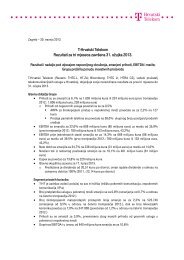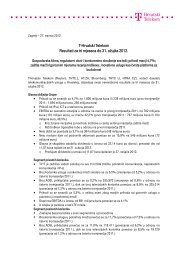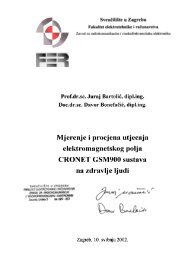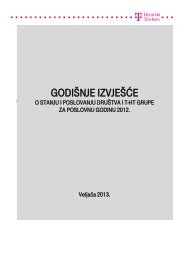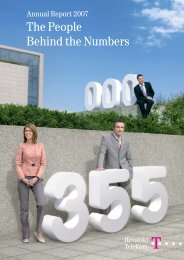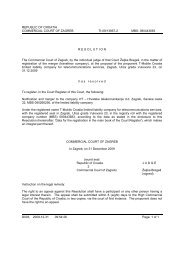Annual Report 2011 - T-Hrvatski Telekom
Annual Report 2011 - T-Hrvatski Telekom
Annual Report 2011 - T-Hrvatski Telekom
Create successful ePaper yourself
Turn your PDF publications into a flip-book with our unique Google optimized e-Paper software.
65<br />
Capital expenditure<br />
Capital expenditure in <strong>2011</strong> (HRK 877 million) was<br />
down on 2010 by 23.9%, largely due to the slower<br />
realization of backbone and backhaul projects and<br />
the reprioritization of real-estate related projects.<br />
by one-off benefits, the revaluation of points related<br />
to a mobile loyalty program, the change of useful life<br />
of customer relationship and termination of a fixed<br />
loyalty program.<br />
Voice revenue<br />
Financial Review <strong>2011</strong><br />
The Residential segment saw slightly higher<br />
capital expenditure in <strong>2011</strong>, primarily as a result<br />
of the change in treatment of Consumer Premises<br />
Equipment (CPE) from OPEX to CAPEX in the second<br />
half of 2010, and as a result of increased capital<br />
expenditure related to IT.<br />
Business segment capital expenditure rose in<br />
<strong>2011</strong>, due in large part to increased investments in<br />
business-related IT solutions as well as a change<br />
in the treatment of CPE equipment and increased<br />
investment in Group subsidiaries.<br />
Capital expenditure in the Network and Support<br />
Functions segment was lower in <strong>2011</strong>, mostly due<br />
to the slower realization of backbone and backhaul<br />
projects.<br />
Analysis of segment results<br />
Business units: Residential and Business<br />
On 1 January 2010, the former divisions of T-Com<br />
and T-Mobile, serving the fixed and mobile markets<br />
respectively, were replaced by a new structure based<br />
on the Residential and Business segments. Starting<br />
from the first quarter of <strong>2011</strong>, segmental reporting<br />
was introduced along these lines. In its financial<br />
reports, the Group’s segments are reported by<br />
contribution to EBITDA level.<br />
Residential Segment Financial review<br />
Revenue<br />
Total residential revenue in <strong>2011</strong> fell 4.4 % to HRK<br />
4,433 million, largely on lower voice revenue both in<br />
mobile and fixed.<br />
This revenue trend has been driven by the slow<br />
economic recovery in Croatia, regulatory tightening<br />
and intensifying competition. Revenue was supported<br />
Voice revenue at the end of <strong>2011</strong> was down 12.6%<br />
at HRK 2,582 million. Retail mobile voice revenue<br />
fell as a result of a highly competitive market,<br />
downward pressure on pricing and a harsh economic<br />
environment. In addition, voice mobile termination<br />
revenue was lower following reductions in termination<br />
rates. Mobile minutes of use (MOU) per average<br />
subscriber remained largely flat, so the revenue<br />
decline was the result of lower average revenue<br />
per usage (ARPU) arising from the tough economic<br />
environment. Fixed telephony revenue fell due to the<br />
continuation of fixed to mobile substitution, fixed to<br />
internet substitution, stronger competition and new<br />
regulation (such as WLR and naked ADSL regulation),<br />
leading to a 12.0% fall in the number of mainlines<br />
and a 10.2% decline in minutes of use. As a result of<br />
lower minutes spent and downward pricing pressure,<br />
voice average revenue per access (ARPA) declined<br />
by 5.7%.<br />
Non voice revenue<br />
Non voice revenue rose 6.1%, to HRK 1,500 million<br />
as a result of higher revenue from fixed services.<br />
Mobile services fell 7.2% to HRK 461 million mainly<br />
in prepaid segment, affected by economic crises and<br />
competitiveness that resulted with price decreasing.<br />
In comparison with last year there is visible lower<br />
revenue from messages services that could not be<br />
compensated with data revenue growth. Fixed non<br />
voice (IP) revenue was boosted by a 2.9% increase in<br />
ADSL mainlines and a 12.3% rise in TV subscribers.<br />
ADSL ARPA fell 3.1%, mostly due to stronger<br />
marketing and promotional offers for ADSL access<br />
and usage.<br />
Other service revenue<br />
Other service revenue rose 189.7% to HRK 182<br />
million as a result of higher revenue from usage<br />
bundle tariffs.




